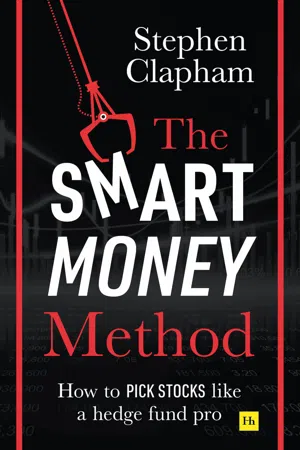
- English
- ePUB (mobile friendly)
- Available on iOS & Android
About this book
In The Smart Money Method, the stock-picking techniques used by top industry professionals are laid bare for investors. This is the inside track on how top hedge funds pick stocks and build portfolios to make outsize returns.Stephen Clapham is a retired hedge fund partner who now trains stock analysts at some of the world's largest and most successful institutional investors. He explains step-by-step his research process for picking stocks and testing their market-beating potential.His methodology provides the tools and techniques to research new stock ideas, as well as maintain and eventually sell an investment.From testing your thesis and making investment decisions, to managing your portfolio and deciding when to buy and sell, The Smart Money Method covers everything you need to know to avoid common pitfalls and invest with confidence.Unique insight is presented in several specific areas, including how to:•Find stock ideas•Assess the quality of any business•Judge management's ability•Identify shady accounting and avoid dying companies•Value any business to find bargain shares•Navigate the consequences of COVID-19And throughout, there are real-life investing examples and war stories from a 25-year career in stock markets.The message is clear – you can beat the market. To do so, you need to learn and apply the insider secrets contained within this book.
Frequently asked questions
- Essential is ideal for learners and professionals who enjoy exploring a wide range of subjects. Access the Essential Library with 800,000+ trusted titles and best-sellers across business, personal growth, and the humanities. Includes unlimited reading time and Standard Read Aloud voice.
- Complete: Perfect for advanced learners and researchers needing full, unrestricted access. Unlock 1.4M+ books across hundreds of subjects, including academic and specialized titles. The Complete Plan also includes advanced features like Premium Read Aloud and Research Assistant.
Please note we cannot support devices running on iOS 13 and Android 7 or earlier. Learn more about using the app.
Information
- Li Ka-shing is a billionaire and one of the world’s most successful businesspeople.
- Many of the assets owned by the holding company would command multiples of twice or three times the parent, if separately quoted.
- The group had a spread of interests, both geographically and across sectors, which should make it highly resilient to a downturn, reducing investment risk.
- would appreciate by 50% or more over an 18–30 month period, or
- had 20% or more absolute downside in a prevailing bull market.
- The stock has to be rerated, i.e., market participants are prepared to pay a higher multiple of earnings or cash flow.
- The company has to generate high returns on capital and strong cash flows, and reinvest those cash flows at similarly high rates.
- The company’s earnings have to increase, or consensus estimates of those earnings have to increase.
Table of contents
- Contents
- About the author
- Preface
- Introduction
- Acknowledgements
- Publishing details